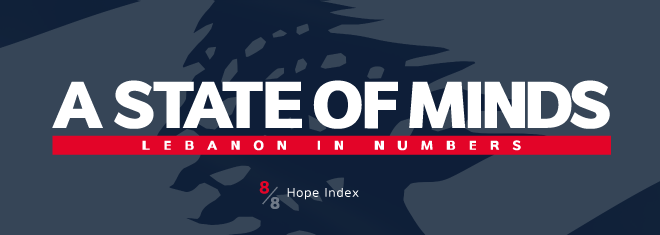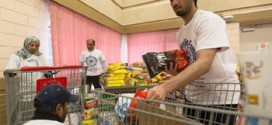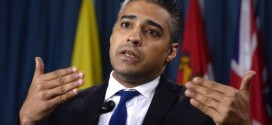As a part of a report called ( A State of Mind ) Lebanon in Number
IntroductionAccess to reliable data on socio-economic and political issues in Lebanon has been a rare and seasonal privilege, more often than not restricted to private circles. As a result, statistics offering a quantitative perspective on current affairs have been largely absent from the public debate, and the few that are available tend to be of questionable provenance and credibility.
In the hope of addressing these needs and better informing the public, NOW's sister company, Quantum Communications, has partnered with the Sofres Liban polling agency to conduct multiple field questionnaires between the months of February and May 2014 on a number of fixed and varied themes. The fieldwork covered a national sample that alternated between 1,500 and 2,000 respondents and aimed to be representative in terms of such demographic factors as gender, age, confession, geographical region, education level and vocation.
NOW retains online exclusivity to publish the findings of these polls while offering commentary on the numbers in question. A total of eight themes will be addressed, both quantitatively and qualitatively, with an aim to reflect the Lebanese state of mind regarding the key issues facing the nation today, from optimism for the future and trust in politicians to government priorities and preferred presidential candidates.
In the first instalment, NOW
looked at the hotly-debated question of Hezbollah's military intervention in Syria. In the second, NOW
revealed who Lebanon wants to see as its next president. In the
third, NOW unearthed the people's views on the new cabinet. In the
fourth, NOW asked respondents what issues that cabinet should be prioritizing. In the
fifth, NOW discovered the Lebanese people's views on the recently concluded presidency of Michel Suleiman. In the
sixth, NOW discovered which political figures the Lebanese would like to see play a bigger role in future. In the
seventh, NOW asked Lebanese which party or political line they consider their point of reference. Below, NOW asks whether the Lebanese people are optimistic or pessimistic about the general situation in Lebanon, currently and in five years.
Access to reliable data on socio-economic and political issues in Lebanon has been a rare and seasonal privilege, more often than not restricted to private circles. As a result, statistics offering a quantitative perspective on current affairs have been largely absent from the public debate, and the few that are available tend to be of questionable provenance and credibility.
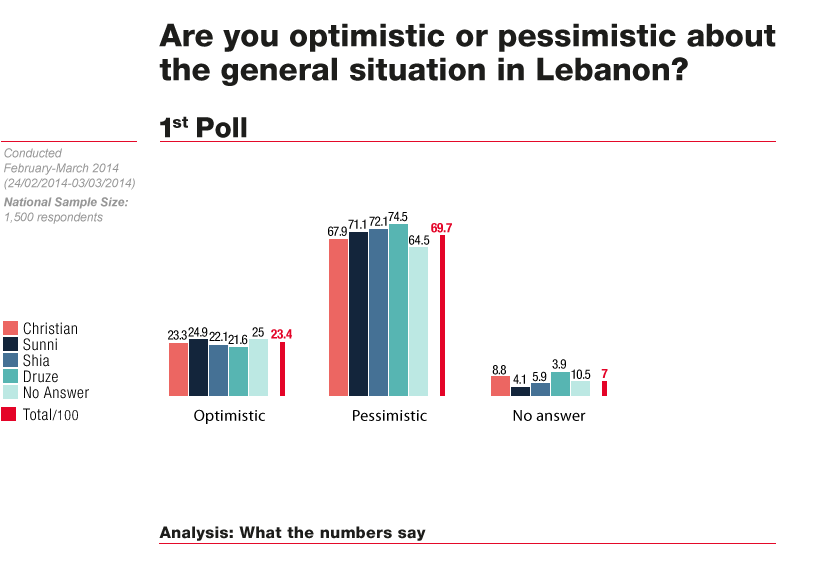 To discover if the Lebanese people were optimistic or pessimistic, four polls were conducted. The first three polls asked if the Lebanese people are optimistic or pessimistic about the situation in Lebanon at the present time and the fourth poll was intended to project the hope index of the Lebanese people in five years.
To discover if the Lebanese people were optimistic or pessimistic, four polls were conducted. The first three polls asked if the Lebanese people are optimistic or pessimistic about the situation in Lebanon at the present time and the fourth poll was intended to project the hope index of the Lebanese people in five years.
In the four polls, the Lebanese people were more pessimistic than optimistic. Average optimism increased slightly from 23.4% in the first poll, conducted between early February and early March 2014, to 26.8% in the last poll, conducted in May 2014. By contrast, the Lebanese people seemed more optimistic about the situation in five years, where average optimism increased to 38.8% and pessimism decreased to 47.8%.
When the numbers were divided by sect for the first three polls, the most optimistic were either from the Sunni community or the Christian community, with the latter being less pessimistic between the two. In the four polls, the most pessimistic and the least optimistic people were from the Druze community.
When asked whether they were optimistic or pessimistic about how the situation will be in Lebanon in five years, the difference between the optimism and the pessimism averages became smaller. The most optimistic people were from the Shiite community (44.2%) whereas the most pessimistic people were still the Druze (62.8%).
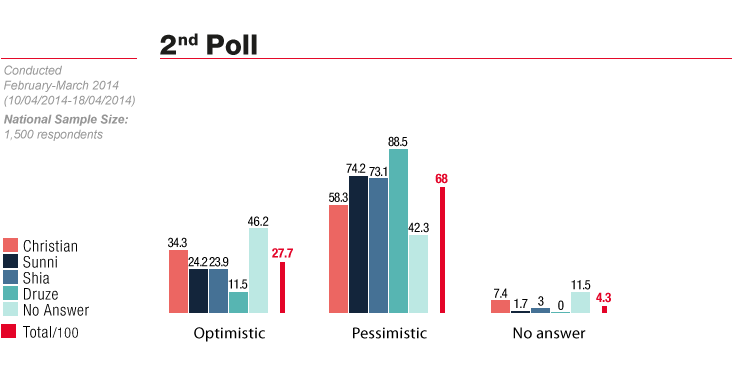
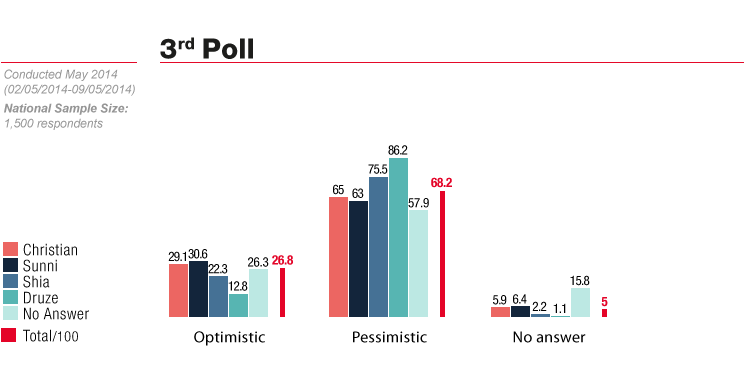
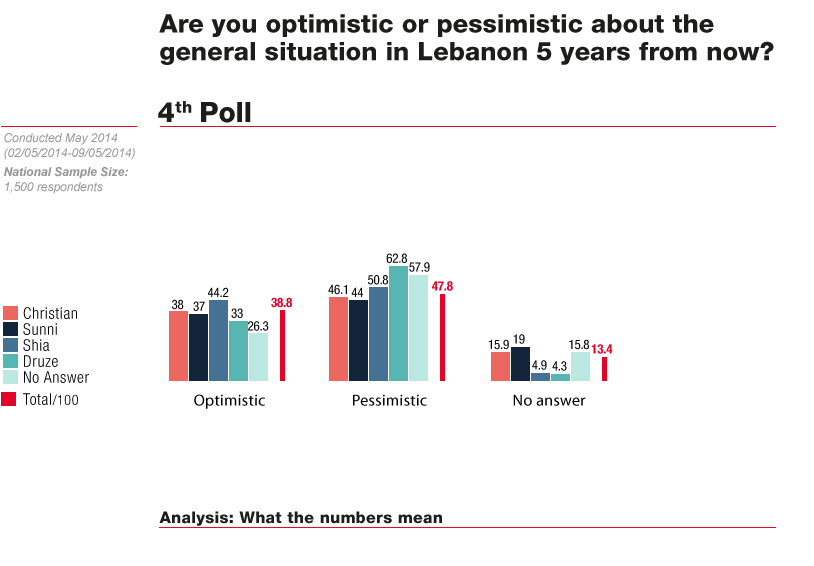 Analysts NOW spoke to say that when Lebanese people are realistic and can’t see a near-term solution for the situation in Lebanon, this is when they are most likely to be pessimistic. "The five-year assessment is a matter of wishful thinking based on hope. Humans are generally more optimistic than they are realistic," said Dr. Joseph el-Khoury, assistant professor of Clinical Psychiatry at Saint George's Hospital University Medical Center.
Analysts NOW spoke to say that when Lebanese people are realistic and can’t see a near-term solution for the situation in Lebanon, this is when they are most likely to be pessimistic. "The five-year assessment is a matter of wishful thinking based on hope. Humans are generally more optimistic than they are realistic," said Dr. Joseph el-Khoury, assistant professor of Clinical Psychiatry at Saint George's Hospital University Medical Center.
The increased optimism about the situation in Lebanon five years from now is an "instinct for survival," according to clinical psychologist Dr. Danielle Pichon. "Lebanese people prefer to believe that the situation will be better in five years, even if this belief is not realistic.
Lebanese Christians were the most optimistic because, analyzing the current situation in the region, "the war between Sunnis and Shiites allowed the Christians to have a time of respite," said Pichon.
The Druze, being a small community in Lebanon, were the most pessimistic about the current situation in Lebanon and in five years. "The Druze, being a minority, try to isolate themselves because they don't have a direct reference. They are in animosity with Muslims: Muslim communities try to consider the Druze community to be part of the Muslim community, but this is not what the Druze want. They are afraid of disappearing," said Pichon.
Although the Shiite community seems very pessimistic about the current situation in Lebanon, it seems a lot more optimistic about the situation in five years, despite the fact that religious struggles between Sunnis and Shiites will not end in the near future. That optimism is difficult to account for, says Pichon. "The Shite community might seem optimistic because they think that Iran will take control of the situation, though considering this is a lack of consciousness and unrealistic."
But the Lebanese people as a whole may have different assessments of the current situation in Lebanon and in future regardless of their sectarian affiliation. "Every major political event might significantly shift the results of optimism or pessimism, as people will use the most recent significant information in making their judgment," Khoury told NOW.
Myra Abdallah contributed to analysis.
First published by
NOW.
 To discover if the Lebanese people were optimistic or pessimistic, four polls were conducted. The first three polls asked if the Lebanese people are optimistic or pessimistic about the situation in Lebanon at the present time and the fourth poll was intended to project the hope index of the Lebanese people in five years.
In the four polls, the Lebanese people were more pessimistic than optimistic. Average optimism increased slightly from 23.4% in the first poll, conducted between early February and early March 2014, to 26.8% in the last poll, conducted in May 2014. By contrast, the Lebanese people seemed more optimistic about the situation in five years, where average optimism increased to 38.8% and pessimism decreased to 47.8%.
When the numbers were divided by sect for the first three polls, the most optimistic were either from the Sunni community or the Christian community, with the latter being less pessimistic between the two. In the four polls, the most pessimistic and the least optimistic people were from the Druze community.
When asked whether they were optimistic or pessimistic about how the situation will be in Lebanon in five years, the difference between the optimism and the pessimism averages became smaller. The most optimistic people were from the Shiite community (44.2%) whereas the most pessimistic people were still the Druze (62.8%).
To discover if the Lebanese people were optimistic or pessimistic, four polls were conducted. The first three polls asked if the Lebanese people are optimistic or pessimistic about the situation in Lebanon at the present time and the fourth poll was intended to project the hope index of the Lebanese people in five years.
In the four polls, the Lebanese people were more pessimistic than optimistic. Average optimism increased slightly from 23.4% in the first poll, conducted between early February and early March 2014, to 26.8% in the last poll, conducted in May 2014. By contrast, the Lebanese people seemed more optimistic about the situation in five years, where average optimism increased to 38.8% and pessimism decreased to 47.8%.
When the numbers were divided by sect for the first three polls, the most optimistic were either from the Sunni community or the Christian community, with the latter being less pessimistic between the two. In the four polls, the most pessimistic and the least optimistic people were from the Druze community.
When asked whether they were optimistic or pessimistic about how the situation will be in Lebanon in five years, the difference between the optimism and the pessimism averages became smaller. The most optimistic people were from the Shiite community (44.2%) whereas the most pessimistic people were still the Druze (62.8%).


 Analysts NOW spoke to say that when Lebanese people are realistic and can’t see a near-term solution for the situation in Lebanon, this is when they are most likely to be pessimistic. "The five-year assessment is a matter of wishful thinking based on hope. Humans are generally more optimistic than they are realistic," said Dr. Joseph el-Khoury, assistant professor of Clinical Psychiatry at Saint George's Hospital University Medical Center.
The increased optimism about the situation in Lebanon five years from now is an "instinct for survival," according to clinical psychologist Dr. Danielle Pichon. "Lebanese people prefer to believe that the situation will be better in five years, even if this belief is not realistic.
Lebanese Christians were the most optimistic because, analyzing the current situation in the region, "the war between Sunnis and Shiites allowed the Christians to have a time of respite," said Pichon.
The Druze, being a small community in Lebanon, were the most pessimistic about the current situation in Lebanon and in five years. "The Druze, being a minority, try to isolate themselves because they don't have a direct reference. They are in animosity with Muslims: Muslim communities try to consider the Druze community to be part of the Muslim community, but this is not what the Druze want. They are afraid of disappearing," said Pichon.
Although the Shiite community seems very pessimistic about the current situation in Lebanon, it seems a lot more optimistic about the situation in five years, despite the fact that religious struggles between Sunnis and Shiites will not end in the near future. That optimism is difficult to account for, says Pichon. "The Shite community might seem optimistic because they think that Iran will take control of the situation, though considering this is a lack of consciousness and unrealistic."
But the Lebanese people as a whole may have different assessments of the current situation in Lebanon and in future regardless of their sectarian affiliation. "Every major political event might significantly shift the results of optimism or pessimism, as people will use the most recent significant information in making their judgment," Khoury told NOW.
Myra Abdallah contributed to analysis.
First published by NOW.
Analysts NOW spoke to say that when Lebanese people are realistic and can’t see a near-term solution for the situation in Lebanon, this is when they are most likely to be pessimistic. "The five-year assessment is a matter of wishful thinking based on hope. Humans are generally more optimistic than they are realistic," said Dr. Joseph el-Khoury, assistant professor of Clinical Psychiatry at Saint George's Hospital University Medical Center.
The increased optimism about the situation in Lebanon five years from now is an "instinct for survival," according to clinical psychologist Dr. Danielle Pichon. "Lebanese people prefer to believe that the situation will be better in five years, even if this belief is not realistic.
Lebanese Christians were the most optimistic because, analyzing the current situation in the region, "the war between Sunnis and Shiites allowed the Christians to have a time of respite," said Pichon.
The Druze, being a small community in Lebanon, were the most pessimistic about the current situation in Lebanon and in five years. "The Druze, being a minority, try to isolate themselves because they don't have a direct reference. They are in animosity with Muslims: Muslim communities try to consider the Druze community to be part of the Muslim community, but this is not what the Druze want. They are afraid of disappearing," said Pichon.
Although the Shiite community seems very pessimistic about the current situation in Lebanon, it seems a lot more optimistic about the situation in five years, despite the fact that religious struggles between Sunnis and Shiites will not end in the near future. That optimism is difficult to account for, says Pichon. "The Shite community might seem optimistic because they think that Iran will take control of the situation, though considering this is a lack of consciousness and unrealistic."
But the Lebanese people as a whole may have different assessments of the current situation in Lebanon and in future regardless of their sectarian affiliation. "Every major political event might significantly shift the results of optimism or pessimism, as people will use the most recent significant information in making their judgment," Khoury told NOW.
Myra Abdallah contributed to analysis.
First published by NOW.
 العربي الديمقراطي The Latest From The Arab World
العربي الديمقراطي The Latest From The Arab World


